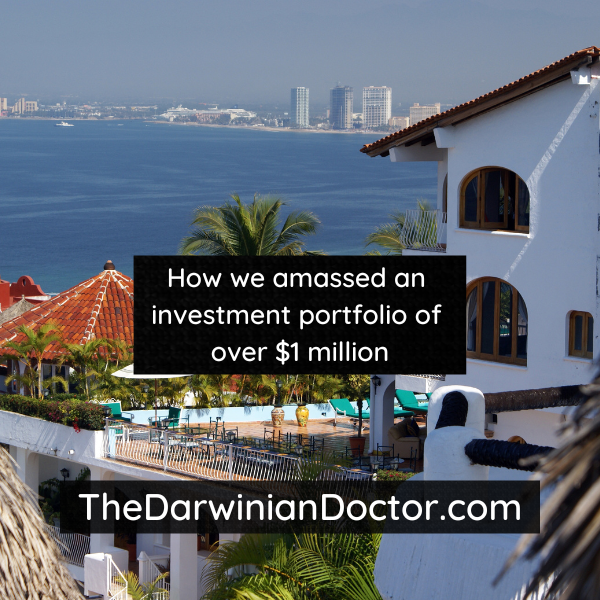Today’s post goes into the origin our our current investment portfolio. How did I go from $300k in debt to $1.28 million in assets? Find out below.

This post may contain affiliate links.
I think some explanation is in order in regards to the value of our current investment portfolio, which as of the writing of this article, includes about $1.28 million of assets (not counting home equity).
Please read this post about how I define an “investment.”
How did we get here? Did I inherit a windfall from a rich grandfather who was particularly fond of me? No, though there is an element of this at play here, as you will read below.
My background: financial insecurity and debt
As you recently read, my childhood was characterized more by financial insecurity than by rich relatives. College was paid for by grants and student loans, and medical school was the same. By the time I graduated residency, I had about $300,000 of student debt. So far, I’ve whittled this down to $240,000 after taking my student loans private at a 3.5% interest rate with First Republic Bank. (affiliate link)
The Darwinian Dr-ess and her generous parents

I can say without hesitation that the majority of our current financial strength can be attributed to the Darwinian Dr-ess (aka wife). While my mountains of debt were growing ever taller in medical school and residency training, she was working full time and socking away the majority of her paychecks.
Also, she was lucky to not have student debt from college or her post-graduate education, because her parents paid for this. This was part 1 of her parents’ approach to inheritance and inter-generational wealth transfer. They paid for all of the Dr-ess’ schooling so she wouldn’t have to start life with crippling amounts of student debt like so many of us nowadays.
After we got married, which was around the time I started residency training in Southern California, her parents helped us buy a house by donating $200k for the down payment. This was part 2 of my in-laws’ approach to inheritance. Between the debt free higher education and house down payment, this powerful one-two punch tackled the two largest outlays of cash that their daughter might face in young adulthood.
What did you feel, reading this last paragraph? Remember that feeling for a question at the end of the article.
Timing the housing market


I was lucky to start my residency training near the bottom of the housing crash. Since my residency was going to take at least 6 years, we decided to buy a house. But even at the bottom of the housing crash, purchasing a house in Southern California would have been out of reach for us without significant help.
With the incredibly generous help of the Dr-ess’ parents, we put 40% down on a cozy two bedroom house with a small backyard complete with an orange tree. It was a fantastic starter house. It cost about $850k in 2010 and lost value over the first year as the housing market bottomed out. But it rebounded strongly, and about eight years later we sold the house for over $1.3 million. While looking at it this way ignores factors like maintenance, insurance and improvements, the initial investment (down payment) of $350k grew over 8 years to $850k, for an annualized compounded rate of return of almost 12%. Behold the power of leverage!
While we rolled a lot of that principal and profit into the downpayment for our current house, some was also funnelled back into the stock market, where it has also grown significantly over the last few years.
While it’s hard to do this retroactively, I believe it accurate to say that that initial seed money for the house still makes up at least a third of our taxable investment portfolio, even with the majority of it diverted into equity in our current house.
A historic bull market

It’s an interesting time to be a financial independence blogger. With few exceptions, the last 10 years of the stock market has been a never-ending race to dizzying heights and company valuations. The brief bear market at the end of 2018 rang some warning bells, as did the recent inverted yield curve in the bond markets. But for now, there is a generation of investors and bloggers, myself included, that have known nothing but bounty in the stock market.
Starting over 10 years ago, the Darwinian Doctor-ess and I started putting away increasing amounts of money into our investment portfolio. At the time, we didn’t know much about investing, save for the advice to go for diversified index funds. I contributed enough to my retirement funds in residency to earn the match, and by the end I had about $20k to roll over into my current employer’s 401(k). After a few years of working as an attending physician, my 401(k) has grown to about $80k.
The Dr-ess has been saving in retirement accounts for well over a decade now. Her retirement accounts total almost $375k.
In terms of taxable accounts, we collectively now have over $700k socked away. Roughly half of this is from profits the sale of our first house, and the rest is from diligent savings and growth of the investments over the years.
Again, I think it’s very important to emphasize the importance of luck in these numbers. If we shift this timeline back 10 years, the tone of my blog would be very different. It would probably be titled “The Destitute Doctor” or “The Demoralized Doctor”. For the most part, the stock market has been very good to us all recently.
Living (somewhat) under our means
We are light years away from Mr. Money Mustache levels of frugality, but within the last year as I’ve learned about financial planning and FIRE, we have attempted to stabilize our spending. We’ve committed to saving increasingly higher amounts of our incomes on what should hopefully be a 15 year plan to financial independence, even at our high level of annual spending. As two high earning professionals, the Dr-ess and I luckily have the ability to work towards all of our financial goals at the same time.
We have a handful of significant indulgences, which include our expensive house, private school for the kids, a beach club membership, and my car (a Tesla Model 3). These are conscious choices to increase our quality of life. That doesn’t necessarily make them good choices, but that’s a conversation for another day.
We could be doing a lot more in this arena to trim our spending, but this is where we are at for now:
Conclusion
Our investment portfolio is very large right now. We are very fortunate.
I think an easy criticism of our current financial picture is that it is a result of generous in-laws, as opposed to hard work. While I readily admit the massive impact the $200k made to our ability to start accumulating wealth, consider that this amount of money is similar to a scenario in which my parents had financed my medical education. What if I had simply graduated from residency training without $300k in student debt?
If you find that scenario somehow more palatable, ask yourself why. Is paying for a child’s education somehow more socially acceptable than helping a child purchase a house? Is that also more acceptable than inheriting a large sum of money?
As an aside, I find the topic of intergenerational wealth very interesting, and I have some strong feelings on the matter. In fact, the Dr-ess and I disagree about this topic on a regular basis. I’ll post about it soon, but suffice to say it’s a complex subject.
Read the post: Inheritance and intergenerational wealth transfer
Through blind luck, the gift of a house down payment coincided with the bottom of the housing market and an unprecedented bull market. This, in addition to the Dr-ess’ steady savings from the last decade, combine to creating our current financial strength. My own contribution is now greatly accelerating our journey to FIRE, but our financial foundation is largely not of my own making.
— TDD
This was originally posted in early 2019. Do you want to see how we took this base and grew it over the next three years?
Read this post: The Darwinian Doctor’s Net Worth and Asset Allocation | Early 2022
So what do you think about the origin of my investment portfolio? How does this post change your opinion about me? Comment below!
Want to support the blog?
- Join our investor club at Cereus Real Estate
- Visit my Recommendations page
- Check out my wife’s food blog: Eat Dessert First
- Stay at our luxury short term rentals
- Check out my TikTok channel
- Follow me on Instagram
- Follow me on YouTube
- Contact me with questions
Perhaps you’re more of a Facebook type?
Are you a physician, spouse, or professional and you’re interested in using Real Estate to gain financial freedom? Join us in our Facebook group and accelerate your journey!




6 comments
When considering a mate, lots of factors enter into it: great face, great body, good personality, morality, education, IQ, in no particular order.
The stronger your own score, the better chance you have of marrying someone with a high score as well.
So picking a wife whose parents were well to do wasn’t really dumb luck. For better or worse, it was part of the equation, and in my mind, the good results still accrue to you.
Do you really think the competition for the daughters of wealthy families isn’t fierce? If she is attractive as well, you had zero chance without being a surgeon lol!
Hey Dr. Bob,
This comment made me laugh out loud, thanks so much! I really did luck out with the Dr-ess. I don’t think I tell her that enough.
But when I showed her your comment, she laughed as well and pointed out that we got together about eight years before I got my MD, and six years before I was an attending surgeon! I guess you could say that she took a gamble, and thankfully it paid off.
Anyway, I feel very flattered by this comment, so thank you!
— TDD
How did the in-laws just gift you $350k for the down payment? There must be some tax implications there or ownership structure? Transfer of assets greater than $10k brings scrutiny, no? I’m just starting to look into doing the same for my eldest daughter.
Hey MR, you’ve got a lucky daughter! You can absolutely help her with a downpayment. Please check with your tax professional, but under current law both you and your spouse can gift your daughter $15k (or $30k total) annually. If you gift more than this in one year, you’ll have to file a gift tax return, but I believe it doesn’t usually trigger additional taxes until you die and your estate is taxed as a whole.
If you want to get around gift tax implications, you can loan your daughter the money. It has to be a real loan with an interest rate, but you can dictate the terms of the loan. Again, talk to your tax professional. There are certainly easy ways to do this.
Know that the bank will want the money to “season” in your daughter’s bank account for 60 days prior to being used towards a downpayment.
— TDD
[…] Read more: How we amassed an investment portfolio of over $1 million […]
Should you do a mega Roth conversion?